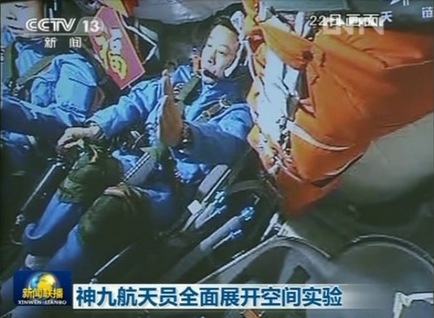Astronauts ready for challenge
 0 Comment(s)
0 Comment(s) Print
Print E-mail Shanghai Daily, June 23, 2012
E-mail Shanghai Daily, June 23, 2012
Chinese astronauts are scheduled to perform Shenzhou 9 spacecraft's first manual docking with the Tiangong 1 space lab module tomorrow, which would be a major step toward China building a permanent space station around 2020.
Shenzhou 9 is currently connected to Tiangong 1 following an automatic docking on Monday.
China Central Television yesterday showed footage of Liu Wang, 43, one of the three Chinese astronauts aboard Tiangong 1, running through drills for the manual docking, while Liu Yang, 33, the country's first female taikonaut, was recording the process.
 |
| China Central Television yesterday showed footage of Liu Wang playing the harmonica during the video conversation with his wife to celebrate her birthday. |
The astronauts will return to the spacecraft again and separate the module for the manual docking to be performed by Liu Wang.
"A manual docking, if successful, will demonstrate the country's grasp of essential space rendezvous and docking techniques," said Zhou Jianping, chief engineer of China's manned space program.
When building a space station, components will be sent into space separately before being assembled using a variety of docking procedures.
The three astronauts entered the cabin of the Tiangong 1 on Monday afternoon, becoming the first group of Chinese to enter an orbiter in space.
The environment inside the orbiter has been comfortable, with the temperature at 22 to 23 degrees Celsius and the humidity at 40 percent, said Deng Yibing, chief engineer of the astronaut training center.
Although they experience 16 sunrises and sunsets every 24 hours as the orbiter circles Earth every 90 minutes, astronauts wake up and rest on Earth time. "They get up at 6am Beijing time every day and go to bed in the evening," Deng said.
Meals for the astronauts include rice, two dishes, soup and fruit, which are packed separately in aluminum bags, said Chen Bin, an expert with the China Aerospace Medicine Research Center.
The astronauts insert the bags into a heater that looks like toaster before eating. "We try to make them feel they can eat the same food in space as on the ground," Chen said.
One breakfast included fried rice, mushrooms and shredded pork with salted cabbage. A lunch had curried fried rice, mushrooms and chicken, peas, chocolate, lemon tea and spicy sauce. The dinner had different dishes of beef filet with black pepper and lotus root.
Nutritionists customized the menu for each astronaut after talking with them.
"I like sour and spicy food, so they prepared vinegar and chili sauce for me," said Jing Haipeng, 45, the flight leader.
The astronauts called their family via a video phone yesterday. Liu Wang played the harmonica during the video conversation with his wife to celebrate her birthday.






Go to Forum >>0 Comment(s)